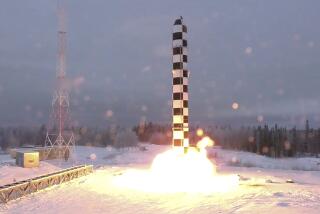If Yeltsin Loses Runoff, Transfer of Power Could Be Messy
- Share via
MOSCOW — If Communist candidate Gennady A. Zyuganov is the upset victor in this week’s presidential runoff, Russia--for the first time in its 1,000-year history--will face the prospect of a peaceful transfer of power from an incumbent leader to the challenger who defeated him.
But just days before the election, there remains uncertainty about how such a transition would occur--including how the “nuclear button” that controls Russia’s vast nuclear arsenal would be transferred.
Russian law says little about the procedure other than that the new president should take his post 30 days after the Central Election Commission finalizes the vote count.
“The fact is that the Russian Constitution has an article devoted to the transfer of power, but it doesn’t say how,” said Maxim A. Dianov, a spokesman for Zyuganov. “It states only that the transfer should be stipulated by the law.”
The Duma, the Communist-dominated lower house of parliament, did pass a law that set out a detailed schedule for the transition, but President Boris N. Yeltsin rejected the blueprint in late May. By that time, the Duma had adjourned with no plans to meet again before the runoff.
“It’s incredibly unusual,” said Michael McFaul, a political analyst in Moscow for the Carnegie Endowment for International Peace. “Russia has no precedent at all for such a procedure, so they can’t go back to tradition.”
The failure by Western observers to raise a fuss about the lack of a procedure may reflect their collective state of denial about the possibility of a Yeltsin defeat in Wednesday’s runoff. But Yeltsin led Zyuganov by only three percentage points in the first round last month. Although recent polls show Yeltsin with a solid lead, polls underestimated Zyuganov’s support in the first round and pollsters concede that the same is probably true now.
“I don’t think anybody has thought about the transition, because it seems like such a technical issue,” McFaul said. “But there will be a lot of people commenting on it July 4 if Zyuganov wins.”
Communists criticized Yeltsin for rejecting the Duma’s law.
“Yeltsin ought to have signed the law before the election,” Zyuganov said over the weekend. “Apparently he is not all that confident in his position, and that’s when he refrained from signing.”
But Zyuganov did not use the opportunity to suggest that Yeltsin might refuse to step down if he lost.
Yeltsin aides said he vetoed the Duma’s law because of concern over a clause stating that if it was impossible to hold the inauguration in the Kremlin, it could be held elsewhere. They said the clause could have given the Communists a legal shield for challenging the final vote tally, holding their own inauguration for Zyuganov elsewhere and setting up a shadow presidency.
“The incumbent will be taking the oath officially and ceremoniously in Moscow, while in another city, unofficially but no less ceremoniously, another person, who on the basis of figures from his alternative commission or observers believes he has been elected, will also be inaugurated,” Alexander Kotenkov, Yeltsin’s representative to the Duma, told the Interfax news service.
But Yeltsin’s advisors stressed that if Zyuganov wins the election, Yeltsin will abide by the constitution and become the first Russian leader to hand over power to his elected successor.
“There are no reasons to expect that he will act unconstitutionally,” said Mikhail A. Krasnov, Yeltsin’s legal affairs advisor.
When Yeltsin was inaugurated five years ago as Russia’s first democratically elected president, there was still a Soviet Union: The “nuclear suitcase,” as it is known in Russia, remained in Soviet leader Mikhail S. Gorbachev’s hands.
Yeltsin took control of Russia’s nuclear arsenal five months later, on Christmas Day 1991, when the Soviet Union was officially dissolved.
More to Read
Sign up for Essential California
The most important California stories and recommendations in your inbox every morning.
You may occasionally receive promotional content from the Los Angeles Times.













